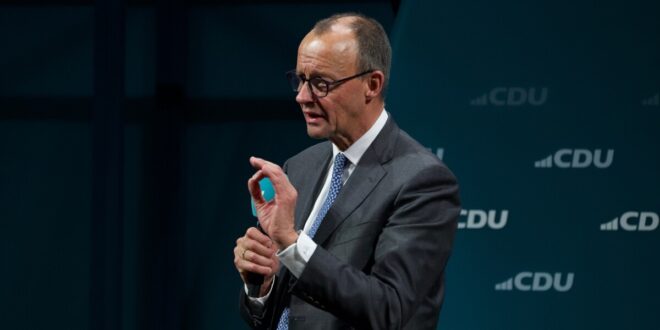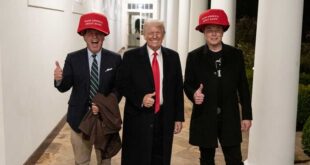Incoming German chancellor Friedrich Merz is working overtime to warn Germans that the time of stagnation that prevailed under the former chancellor Olaf Scholz must come to an end.
There was nothing grandiose about the German election on Sunday, but it will more than likely result in a grand coalition. After waiting in the wings for several decades, Friedrich Merz, the head of the Christian Democrats, is set to become the next chancellor in a coalition government with the Social Democrats, who headed the previous government but sank to a mere 16 percent of the overall vote. For Germany, it represents a last chance to shore up the fortunes of the mainstream parties, reboot the economy and above all reorient Germany away from the lure of the far right.
When I attended an election party in Munich on Sunday at the headquarters of the Christian Social Union (which is the Bavarian sister party of the Christian Democrats), elections expert Antonia Ferrier explained to me that “Germany is a country under stress.” That helped to account for the restrained mood at the headquarters in Munich and for Merz’s own earnest tone as he addressed party stalwarts at the Konrad-Adenauer House in Berlin. A day earlier, at a festive political rally at the Loewenbraeukeller, Merz had already intimated to the audience that America was not necessarily a reliable partner of Germany and Europe.
On Sunday, he went further. He warned that Donald Trump’s America bore similarities to Vladimir Putin’s Russia and that Germany could not count on Trump extending the American nuclear umbrella over Europe. On national television, he said, “My absolute priority will be to strengthen Europe as quickly as possible so that, step by step, we can really achieve independence from the USA.” He added, “I never thought I would say something like this on a television program. But after Donald Trump’s statements last week at the latest, it is clear that the Americans, at least this part of the Americans, this administration, are largely indifferent to the fate of Europe.”
At the heart of Merz’s apprehensions is the war in Ukraine, which marked the third year of Russia’s invasion today. Ursula von der Leyen, the president of the European Commission, visited Kyiv to announce a new 3.5 billion support package for it. “A free and sovereign Ukraine is in the interest of the whole world,” she said. She emphasized that the EU will accelerate the transfer of weapons and munitions to Ukraine. In addition, the electric grids of Ukraine and Moldova are on course to be fully integrated into the European electric market by the end of next year.
Under Merz, Germany will play a key role in bolstering European support for Ukraine. During the Cold War, the Franco-German relationship was key to countering the Soviet Union. Merz will revive it to counter Putin. French president Emmanuel Macron consulted with Merz before traveling to Washington today to meet with Trump about Ukraine.
At the same time, Merz will move to bolster defense spending. He has stated that Germany may need to ease its debt brake. But his narrow victory means that he faces a conundrum. The Christian Democrats and Social Democrats have 328 seats. The left and right possess a blocking minority in the Bundestag with 216 seats—reform of the debt brake or special funds, dependent on a 2/3 majority, could only occur with their cooperation.
Both the far-right Alternative for Germany (AFD) Party, which scored over 20 percent in the election to become the second largest party in the Bundestag, and the far left Die Linke party favor an emollient approach toward Moscow. What’s more, a faction in the SPD, as Christian Forstner, the Washington representative of the Hanns-Seidel Foundation, believes in “the continuation of Ostpolitik tradition,” or détente with the East. “They are still holding to the strategic belief,” he notes, “that there is no peace in Europe without Russia. And Moscow holds the key to eastern European security.”
Still, Merz is working overtime to warn Germans that the time of stagnation that prevailed under the former chancellor Olaf Scholz must come to an end. He has been direct and forceful, displaying a kind of moral vision that Scholz was incapable of enunciating. Both Germany’s economy and foreign policy are in drastic need of an overhaul. With the AFD waiting on the sidelines, any new German government coalition must hang together or hang separately.
 Geostrategic Media Political Commentary, Analysis, Security, Defense
Geostrategic Media Political Commentary, Analysis, Security, Defense





